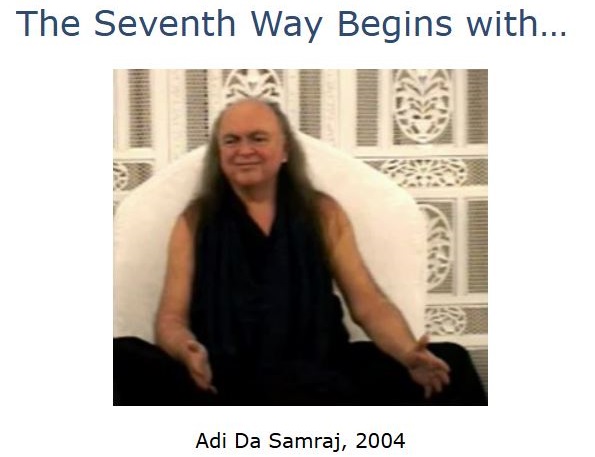Beezone Note: ‘Seven,’ denoting quantity, and ‘Seventh,’ indicating position or order, are used interchangeably.

***
The following is a Beezone commentary on a discourse Adi Da Samraj gave in 2004 on the paradoxical nature of “The Seventh Stage Way of Adidam.” The discourse illuminates his teaching on Perfect Realization, Seven Stage Practice, and Perfect Renunciation, forming a profound sadhana that challenges conventional understanding. This essay explores how his teaching intertwines logic with paradox to convey the transformative Process of Divine Realization—a Realization that is both immediate and progressive, both here and beyond, both understandable and confounding.
Perfect Realization and the Seven Stages
Adi Da’s notion of Perfect Realization in the “Seventh Stage Way” might seem straightforward at first glance, and easily codified, yet its fundamental paradox reveals itself upon deeper examination. His notion of the “Perfect Practice” is not about reaching an endpoint, such as the Seventh and final Stage, as one might understand. Instead, it is about an immediate “Recognition” of Adi Da’s Divine State—a State that one’s consciousness intuits beyond conventional identity. Through this Recognition, a student or devotee intuits THE Divine Truth that lies within and around them, beyond the body-mind and the ordinary conditions of existence. This intuition is not just an idea; it calls forth a “lawful” and spontaneous response, one grounded in what Adi Da calls “Grace.” The Seventh Stage of Life is not merely an endpoint but an unfolding awareness that infuses all previous states and stages, beginning with an intuition that is profoundly transformative and intrinsically linked to renunciation.
Paradox of Prior and Arising
Adi Da teaches that this beginning stage of the “Seventh Stage Way” exists “prior to” the body-mind—yet paradoxically, it does not negate the existence of the body or mind. The body, mind, and world continue to arise, yet they are seen from a perspective where they lose their binding power. This state is termed “Only One,” a pure consciousness that sees through worldly illusions without necessarily removing them. The paradox here lies in that the material and mental conditions persist, but their hold on the practioner dissipates. This is, in effect, a dual awareness: the ordinary world persists, but the binding perception of its reality is transcended. In Buddhist terms, it is akin to the world of “Transcendental Logic” or in Madhyamika, where binary thinking collapses, and contradictions are reconciled.
The Progressive Non-Progression
Adi Da distinguishes his path from traditional spiritual practices, describing it as a “progressive non-progression.” Though there is “progress” in a sense, it differs fundamentally from the sequential advancements seen in conventional spirituality. Practitioners who ‘truly practice’ begin their journey with an awareness of THE/HIS Divine State, yet are often still bound by attachments typical of the earlier stages—attachments to money, food, sex, and survival. Despite this “Seventh Stage from the Beginning,” practitioners find themselves entangled in worldly struggles, which indicates an imperfect recognition. Adi Da critiques this “talking school” level of development, where practitioners endlessly discuss renunciation without fully embodying it. He emphasizes that true spiritual practice should not linger in endless adaptation and discipline but should instead “practce” a “Perfect Practice”!
The Paradox of Grace and Intervention
A core aspect of Adi Da’s teaching is the role of The Guru’s Grace, which introduces yet another paradox. If there is only One Way, the Seventh Stage Way, then why is there a need for Grace or divine intervention? Adi Da describes Grace as a profound necessity, a bridge across the chasm of human limitation. He states, “There is ONLY ONE WAY, never two or many,” yet Grace implies intervention beyond oneself, a Divine assistance that paradoxically enforces self-sufficiency. Through this paradox, Adi Da stresses that Divine Realization is not solely a matter of individual effort or discipline but a cooperative unfolding with the Divine.
The Cost of Refusal and the Double-Bind
Adi Da’s message also addresses the implications of “refusing” the Perfect Way, a refusal that plunges practitioners back into the repetitive cycles of conditional existence. The paradox here is one of choice and compulsion: on the one hand, practitioners are drawn toward the Divine; on the other, their refusals to engage in a profound level of practice leave them bound to the endless “Ups and Downs, Rounds and Rounds” of worldly existence. This refusal is itself a paradox, for in rejecting Divine Realization, practitioners reinforce the very dualities they seek to transcend. This condition is rooted in a “maddening logic,” reflective of Adi Da’s persistent “shout” for practitioners to awaken.
Perfect Recognition and the Challenge of Embodiment
Adi Da’s approach contrasts with traditional teachings through his emphasis on the “First Recognition Response” to his state, an awareness that “you got it.” However, what follows this first recognition varies. Herein lies another paradox: practitioners may recognize Adi Da’s teaching on an intellectual level, yet the actual journey of embodying it remains challenging and multilayered. This first recognition is not “Perfect Recognition” but a initial and initiatory awareness that must one must carry forth and deepen over time.
This complex relationship between Recognition and embodiment requires an openness to paradox—a “letting go”, “surrender”, “yielding” of conventional logic and an embracing of PARADOX that does not simply yield answers but deepens OVER TIME. In this regard, Adi Da’s path presents a profound invitation to experience spiritual truths that lie beyond ordinary reason and resolution, a PRACTICE that is both endlessly unfolding and PERFECT at the same TIME.